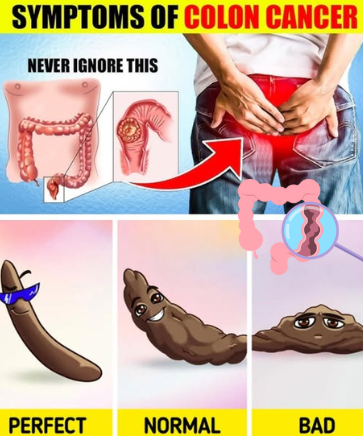
Why Early Detection Matters
Colon cancer, also called colorectal cancer, is one of the most common cancers worldwide. The good news? It’s highly treatable when caught early. The challenge is that many people mistake early symptoms for everyday digestive problems like gas, bloating, or mild constipation. Ignoring these signs can delay diagnosis and make treatment more complicated.
Your body often gives you subtle warnings long before cancer advances. Learning to recognize these signals could literally save your life. Here are eight early warning signs of colon cancer that should never be ignored.
Persistent Changes in Bowel Habits
A sudden and ongoing change in how your bowels function is one of the earliest warning signs. If you notice diarrhea, constipation, or unusual stool consistency lasting more than a few days, take it seriously. Tumors in the colon can interfere with digestion and normal bowel movements.
It’s easy to dismiss this as something you ate, but if the problem lingers, it’s your body’s way of telling you something deeper could be wrong.
Blood in the Stool
Seeing blood in your stool can feel frightening—and it should prompt immediate attention. Sometimes, blood appears bright red, while other times, it makes stools look darker or tarry. While hemorrhoids or small tears can cause bleeding, persistent blood in the stool is a red flag for colon cancer.
If you notice this symptom more than once, don’t ignore it. A medical evaluation is the only way to rule out something serious.
Unexplained Weight Loss
Dropping pounds without dieting or exercising may sound like a dream, but it can be a dangerous sign. Colon cancer can interfere with nutrient absorption, making your body lose weight unexpectedly. Cancer cells also consume a lot of energy, draining your system and contributing to weight loss.
If you’ve lost more than 5–10% of your body weight in a short time without explanation, schedule a checkup.
Persistent Abdominal Discomfort
Chronic abdominal pain, cramping, or bloating that doesn’t go away may point to more than just indigestion. Tumors can block or irritate parts of the colon, causing prolonged discomfort. If your symptoms last for weeks or keep returning, don’t dismiss them as normal stomach trouble.
Your gut health is central to your overall health—persistent pain means it’s time to investigate.
Video : 6 Warning Signs of Colon Cancer
Fatigue and Weakness
We all feel tired sometimes, but colon cancer fatigue is different. When the disease causes slow internal bleeding, anemia (low red blood cell levels) often follows. This leads to constant weakness, pale skin, and shortness of breath.
If you feel drained even after resting well, and everyday tasks leave you exhausted, it may be more than just stress or lack of sleep.
Narrow or Ribbon-Like Stools
If your stools suddenly look thin, narrow, or ribbon-shaped, it could indicate a tumor is narrowing the intestinal passage. While stool size naturally changes depending on diet, a consistent pattern of narrow stools deserves medical attention.
Think of it like a clogged pipe—the space inside the colon becomes smaller, and your stool changes shape as a result.
A Feeling of Incomplete Bowel Movement
Do you ever feel like you haven’t fully emptied your bowels, even after going to the bathroom? This sensation, called tenesmus, may point to a blockage or growth in the rectum or lower colon. If it becomes a regular issue, it’s worth checking out.
Your body shouldn’t leave you feeling unfinished after a bowel movement—if it does, that’s a signal something is off.
Iron Deficiency Anemia
Slow, chronic bleeding in the colon can cause iron levels to drop. Low iron leads to anemia, which can leave you feeling dizzy, pale, and weak. You might also experience frequent headaches or shortness of breath.
If blood tests show iron deficiency without another clear cause, your doctor may recommend further screening for colon health.
When to See a Doctor
If you experience one or more of these symptoms for longer than two weeks, don’t wait it out. Early detection of colon cancer dramatically improves treatment outcomes. Even if your symptoms turn out to be caused by something less serious, getting checked gives you peace of mind.
Prevention Tips for Colon Health
The best defense against colon cancer is prevention and early screening. Here’s how you can lower your risk:
- Eat a diet high in fiber from vegetables, fruits, and whole grains.
- Limit red meat and avoid processed meats.
- Stay physically active and maintain a healthy weight.
- Avoid smoking and limit alcohol.
- Get regular screenings, especially if you’re over 45 or have a family history of colon cancer.
Video : 10 Early Signs of Colon Cancer That Could Save Your Life
Conclusion: Listen to What Your Body Tells You
Colon cancer doesn’t usually appear overnight. It develops slowly, often giving off subtle signs that something isn’t right. Whether it’s blood in the stool, unusual fatigue, or persistent changes in bowel habits, these early warning signals deserve attention.
Don’t dismiss them as minor issues. Acting quickly and consulting a healthcare professional could be the difference between a simple treatment and a more advanced fight. Your health is worth the attention—listen to your body, and take action when it speaks.


